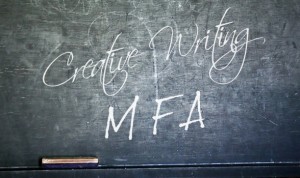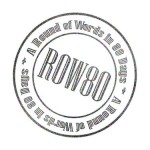Some time ago, I blogged about the question: To MFA or Not To MFA? Since then, several other people, including my fellow New School-ers over at Teen Writers Bloc, have addressed this topic. Lately, as I figure out what direction I want to take with DIY MFA, I’ve been thinking a lot about the MFA in general. If I could do it over again, would I choose to do a writing degree? Absolutely. I’m glad I went to graduate school because it has allowed me the opportunity to share the ins and outs of it with all of you. DIY MFA would not exist it it wasn’t for my own graduate experience and for that I am happy I did it.
Yet, if another aspiring writer came to me and asked for advice, would I recommend an MFA? Absolutely not. Sounds like a contradiction, right? On one hand I’m glad I did an MFA, but on the other I wouldn’t recommend it to fellow writers. Believe me, there is a method to this madness.
Why I Would Not Recommend an MFA to Most Aspiring Writers
1) Most MFA Programs are seriously flawed. I discussed these flaws briefly in this previous post, but I’ve since given this topic more thought and will be doing a more detailed post on the flaws of MFA programs later this week. Suffice it to say for now that many MFA programs create an environment where only a privileged few are able to deepen their study of writing, a fact that flies in the face of my own intrinsic notions of universal fairness.
2) Many writers do MFA’s because they think it’s the only way to get where they want to be in their writing careers. This is often not the case. Let’s face it, there are other ways to study craft and literature. (Um, it’s called reading and last time I checked, library cards were free.) You don’t have to spend thousands of dollars a year to find a critique group or attend literary events. In fact, when I started graduate school, I had already been part of a critique group for two years and had attended numerous conferences, readings and other such events in the writing community.
My point is that there are other options, other ways to broaden your mind as a writer. I did an MFA because I wanted to teach writing, so I needed the credential. When DIY MFA began nagging at my brain, I was doubly happy that I had gone for the degree. But this was me. Other writers whose dreams lean toward publication rather than teaching can find ways of getting there without jumping through the graduate school hoop. Sure, an MFA degree won’t hurt but the question is, do you really need it?
3) Writers who have done MFA’s are more likely to recommend it to others because they’re experiencing Cognitive Dissonance. What is cognitive dissonance, you ask? It’s a psychological theory (developed by Leon Festinger) who found that when people’s behaviors contradict their beliefs, they are likely to adjust their beliefs to justify their behaviors.
In a 1959 study, Festinger & Carlsmith had participants do a boring task (turning pegs quarter turns for long periods of time). Some were paid $1 for doing the task while others were paid $20. Afterwards, participants were asked to rate the task and surprisingly, those who were paid less ($1) actually rated the experience more positively than those who were paid the $20. This is because those who got paid $20 had an obvious external reason to motivate them to do this boring task. Those who only received $1 had to justify to themselves why they would do something so tedious for so little money. Their beliefs actually changed and they truly believed the task was not as bad as it actually was.
So how does Cognitive Dissonance work with the MFA question? Many students have to sacrifice a lot to go back to graduate school and in doing so, they are more likely to unconsciously adjust their beliefs to justify that sacrifice. I’m not saying that all MFA graduates are playing head-games on themselves, but keep in mind that some of them may have a rosier point of view than the experience actually warranted. This is because it’s just too painful for them to admit that they sacrificed so much for an experience that was only OK.
Take-home Message: Ultimately, my point is that MFA programs can be a great fit for some people, but you need to take their advice with a grain of salt. No MFA program is perfect, and chances are it’s closer to so-so than it is to fantastic. There are other options for writers who want to deepen their study but don’t need the credential. DIY MFA is just one of those options and I’m looking forward to expanding it so I can share more of it with you.
Now you tell me: What do you think of the MFA-of-Not question? Would YOU do an MFA in writing?











 Call me Gabi (pronounced gah-BEE). I'm a writer, freelance teacher, and a lover of books and words. I'm also the instigator of DIY MFA. iggi's my sidekick, but he thinks he's the brains behind this operation.
Call me Gabi (pronounced gah-BEE). I'm a writer, freelance teacher, and a lover of books and words. I'm also the instigator of DIY MFA. iggi's my sidekick, but he thinks he's the brains behind this operation.
 YA Cafe: New-and-Improved Book Club
YA Cafe: New-and-Improved Book Club Rock the ROW80
Rock the ROW80 ROW80 Goals Post
ROW80 Goals Post YA Cafe: Banned Books Week
YA Cafe: Banned Books Week